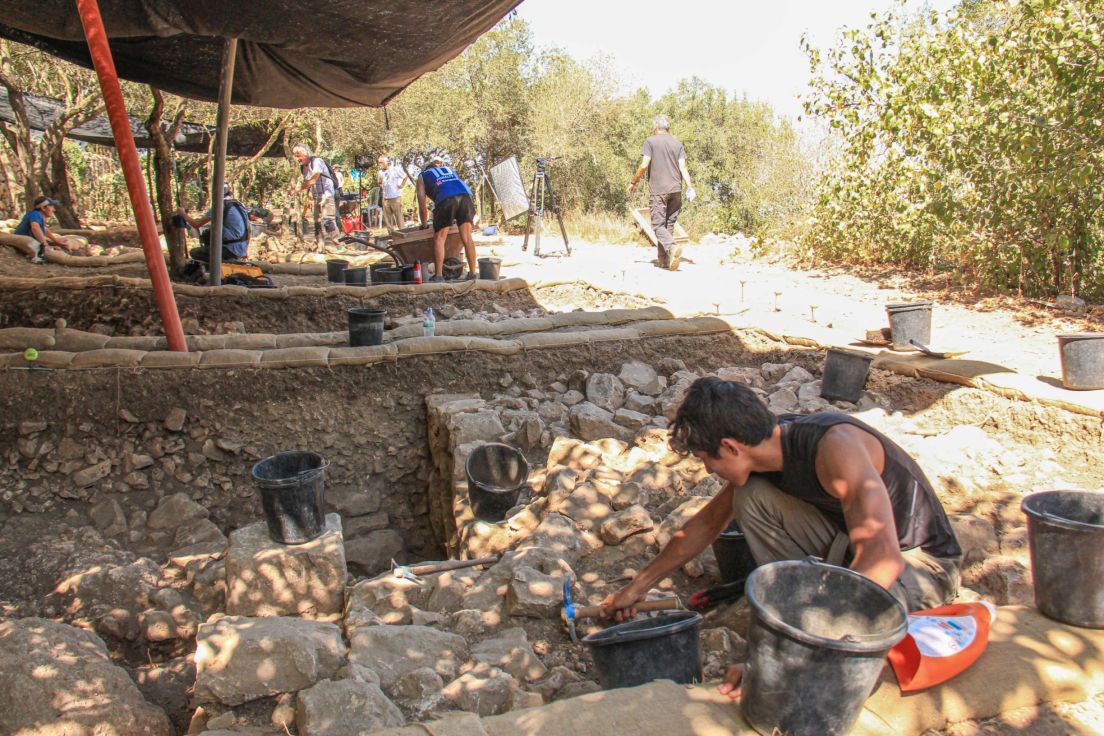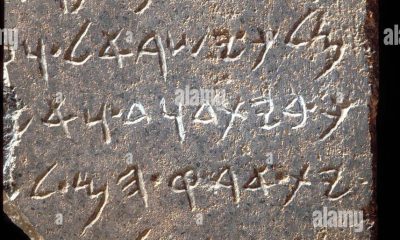world news
Archaeologists may have found biblical town Emmaus, where Christ appeared after His resurrection

Archaeologists believe they might have discovered the location of the town of Emmaus, where Jesus was said to have first appeared before two of his disciples after His resurrection.
Scholars on a Franco-Israeli expedition in Kiriath Yearim that began in 2017 have found a massive, ancient wall of a Hellenistic-era fortress that might have been built by a Seleucid general who defeated the famed Jewish leader featured prominently in the Hanukkah story.
Kiriath Yearim is a hill that overlooks the approach to Jerusalem. It was mentioned various times throughout the Old Testament and is said to have been the location of the Ark of the Covenant for decades before the ark was taken to Jerusalem by King David.
The discovery, researchers say, could help to identify the location of the biblical town of Emmaus. It is written in the book of Luke that it was on the road to Emmaus where Jesus made his first appearance before two of His disciples after His resurrection from the dead.
In the biblical account, the two disciples walk from Jerusalem to Emmaus when the resurrected Jesus joins them on the walk. However, the men do not recognize the man who joined them as Christ.
Later, upon reaching Emmaus, Christ accepted an offer to eat and stay with the men as night fell. After the bread was broken and the food was blessed, the disciples’ eyes were opened and they recognized Jesus. After they recognized Him, according to Luke 24, Jesus vanished from their sight.
According to the book of Luke, the village of Emmaus was located about 60 stadia about 7 miles from Jerusalem.
Haaretz reports that an upcoming study from the expedition that will be published on Oct. 24 makes a suggestion that could have “broader implications for biblical archaeology and Christian history.”
The study is led by Tel Aviv University archaeologist Israel Finkelstein and College de France biblical studies professor Thomas Römer. The researchers suggest that the hill of Kiriath Yearim and the adjacent town of Abu Gosh could be identified as the biblical town of Emmaus that was fortified by Seleucid general Bacchides in the Old Testament.
The book of Maccabees lists a number of cities surrounding Jerusalem in which General Bacchides built fortresses. Those towns included Emmaus, Beth Horon, Bethel, Timnath, Pirathon, Tephon, and Jericho.
Finkelstein and Römer suggest that Kiriath Yearim is Emmaus because there are no other known major Hellenistic strongholds west of Jerusalem.
“Geographically I think that the distance to Jerusalem fits well, so I do think that Kiriath Yearim could have been the Emmaus of the New Testament,” Römer was quoted as saying.
As Haaretz notes, most of the places included on the list in 1 Maccabees 9 can be identified as sites that lie north, south or east of Jerusalem. At some of those sites, Archaeologists have found remains of other Hellenistic fortifications.
“Finkelstein and Römer have a good case archaeologically, geographically, and topographically,” Benjamin Isaac, emeritus professor of ancient history from Tel Aviv University, told Haaretz. “However, it is a hypothesis and remains a hypothesis.”
Isaac warns that there is not enough hard evidence to conclusively link Emmaus to Kiriath Yearim. Isaac notes that there are at least two other sites nearby that could also be Emmaus from the New Testament.
Historian Eusebius of Caesarea from the second and third century identified Emmaus Nicopolis, a Byzantine town in the Ayalon Valley near the modern-day Latrun junction, as the Emmaus mentioned in Luke.
Emmaus Nicopolis was destroyed in the 1967 Six-Day War and the ruins today are part of a national park.
However, Emmaus Nicopolis, lies about 15 miles from Jerusalem, which would be double the distance from Jerusalem described in Luke.
According to Haaretz, others believe that the modern-day village of Motza, which lies between Kiriath Yearim and Jerusalem, is where Emmaus of the Bible was located. However, that village is too close to Jerusalem to fit the description provided in Luke.
According to Römer, the word “Emmaus” is the Greek version of the Hebrew word for “hot spring.” He said there likely could have been a number of towns sharing the Emmaus name.
world news
Chinese Government Boasts About Increased Persecution in 2024

China — In statements on social media and state-owned media platforms, China is celebrating an increase in government persecution of religious minorities in 2024.
The Chinese government views religious freedom as a threat to the exclusive loyalty it believes is owed to the Chinese Communist Party (CCP), which rules the country, and broadly labels non-state religious groups as cults regardless of their actual beliefs.
“China’s public security authorities intensified efforts to dismantle cult organizations in 2024,” the Global Times, a media outlet run by the CCP, reported last month. “They have worked to curb the growth and spread of cult organizations, mitigating potential threats to national political security and maintaining social stability.”
The word rendered as “cult” in the Global Times report is xie jiao, an amorphous term apparently dating back to the Ming Dynasty. It was used to designate movements or beliefs deemed anti-government or that failed to comply with the strict principles of the CCP.
In a statement on the Chinese messaging app and social media platform WeChat, China’s Ministry of Public Security boasted of increased spending on technology and manpower to combat independent religious organizations in a repressive campaign that has included crackdowns on the independent Christian house church movement.
China is known to have forced abortions on its citizens, sterilized women without their consent, and murdered religious minorities to sell their organs on the black market. Christian home churches are an attempt to escape government scrutiny, but even they are often raided and their members arrested on charges of working against the interests of the state.
China is a world leader in the use of technology to surveil and repress its citizens. While the full extent of its surveillance apparatus is unknown, research has shown that it operates a system that aims to track every citizen’s movement to gain insight into their loyalty to the CCP. From mundane details like what a person wears to larger observations like who they associate with, the system works to track and understand the loyalty of each citizen.
Chinese government officials use the data captured by this system to track and control those it deems a danger to the state. Notably, this includes anybody associated with the unregistered house church movement and anyone else who might desire to practice religion outside the confines of the state-run institutions.
Sources:persecution
world news
നൈജീരിയയിൽ വൈദികനെയും വൈദികാർഥിയെയും തട്ടിക്കൊണ്ടുപോയി

നൈജീരിയയിലെ ഔച്ചി കത്തോലിക്കാ രൂപതയിലെ ഇടവക റെക്ടറിയിൽ നിന്ന് ഫാ. ഫിലിപ്പ് എക്വേലിയെയും ഒരു വൈദികാർഥിയെയും അക്രമികൾ തട്ടിക്കൊണ്ടുപോയി. “എഡോ സ്റ്റേറ്റിലെ എറ്റ്സാക്കോ ഈസ്റ്റ് എൽ ജി എ യിലെ ഇവിയുഖുവ-അജെനെബോഡിലുള്ള സെന്റ് പീറ്റർ കത്തോലിക്കാ പള്ളിയിലെ വൈദികരുടെ റെക്ടറിയും പള്ളിയും തോക്കുധാരികൾ ആക്രമിച്ചു” – മാർച്ച് നാലിന് പുറത്തിറക്കിയ ഒരു പ്രസ്താവനയിൽ നൈജീരിയൻ രൂപതയുടെ കമ്മ്യൂണിക്കേഷൻ ഡയറക്ടർ ഫാ. പീറ്റർ എഗിലെവ പറയുന്നു.
“റെക്ടറിയിലെയും പള്ളിയിലെയും വാതിലുകളും ജനലുകളും അക്രമികൾ വെടിവച്ച് തകർത്തു. തുടർന്ന് ഫാ. ഫിലിപ്പ് എക്വേലിയെയും മേജർ സെമിനാരി വിദ്യാർഥിയെയും തട്ടിക്കൊണ്ടുപോകുകയായിരുന്നു. അക്രമികൾ ആയുധങ്ങൾ കാട്ടി ഭീഷണിപ്പെടുത്തിയാണ് അവരെ വനത്തിലേക്ക് കൊണ്ടുപോയത്” – ഫാ. എഗിലെവ വിവരിക്കുന്നു. തട്ടിക്കൊണ്ടുപോകപ്പെട്ടവരുമായി ഇതുവരെ യാതൊരു ആശയവിനിമയവും നടന്നിട്ടില്ലെന്ന് ഫാ. എഗിലെവ പറയുന്നു. തട്ടിക്കൊണ്ടുപോകപ്പെട്ടവർ പരിക്കേൽക്കാതെ മോചിതരാകുന്നതിനായി എല്ലാവരും പ്രാർഥിക്കണമെന്നും അദ്ദേഹം അഭ്യർഥിച്ചു.
2003 ഫെബ്രുവരി 22-ന് ഉദ്ഘാടനം ചെയ്യപ്പെട്ട ഔച്ചി കത്തോലിക്കാ രൂപത, അതിന്റെ ഉദ്ഘാടനത്തിന്റെ ഇരുപത്തിരണ്ടാം വാർഷികം ആഘോഷിച്ചത് അടുത്തിടെയാണ്. കഴിഞ്ഞ 5 വർഷത്തിനുള്ളിൽ, ഈ രൂപതയിലെ എട്ടിലധികം വൈദികരെ തട്ടിക്കൊണ്ടുപോയിട്ടുണ്ട്. 2022-ൽ ഒരാൾ ക്രൂരമായി കൊല്ലപ്പെടുകയും ചെയ്തെന്നു ഫാ. എഗിലെവ കൂട്ടിച്ചേർത്തു.
Sources:azchavattomonline.com
The Edo State Police Command has confirmed the abduction of Rev. Fr. Philip Ekweli and Seminarian Peter Andrew by suspected herders at St. Peter Catholic Church, Ivukwa community, Etsako East Local Government Area.
The command’s spokesperson, Moses Yamu, in a statement on Tuesday, said operatives killed one of the suspected kidnappers while four others were arrested.
Yamu said, “On March 3, 2025, at about 11:30 pm, the command received a distress call from a concerned citizen that armed men, suspected to be herdsmen, stormed St. Peter Catholic Church in Ivukwa, Etsako East LGA, and abducted Rev. Fr. Philip Ekweli and Seminarian Peter Andrew.”
He added that the police, in collaboration with vigilantes and hunters, swiftly moved to the scene and engaged the attackers in a gun duel, leading to the death of one suspect.
“One of the suspects, whose name remains unknown, was neutralised, and his corpse has been deposited at the General Hospital, Agenebode,” he said.
According to the police, items recovered from the suspect include two pairs of rubber shoes, a button phone with two SIM cards, a power bank, a dagger jacket, a bag containing biscuits and Nescafé beverage, and N168,850 in cash.
The four arrested suspects were identified as Murtala Ibrahim (32), Joshua Joseph (31), Sadiq Sheidu (35), and Sunday Bulus (28).
Yamu stated that the Commissioner of Police, Betty Otimenyin, had deployed additional anti-kidnapping operatives and Police Mobile Force personnel to work alongside the military in securing the victims’ release and apprehending the abductors.
Meanwhile, the Bishop of Auchi Diocese, Most Rev. Dr. Gabriel Dunia, has decried the rising cases of attacks on Catholic priests, urging the government to address the worsening security situation in Edo North.
In a statement issued by the diocese’s Director of Communications, Rev. Fr. Peter Egielewa, the bishop lamented that Edo North, once peaceful, had become a hotbed for kidnappers.
The statement read, “The Diocese of Auchi announces with sadness that at about 9:30 pm on Monday, March 3, 2025, gunmen violently attacked the rectory and church of St. Peter Catholic Church, Iviukhua-Agenebode, Etsako East LGA.
“Doors and windows in both the rectory and church were pulled down amid heavy gunfire. Local vigilantes engaged the kidnappers, but due to the superior weapons of the attackers, the parish priest, Rev. Fr. Philip Ekweli, and a major seminarian serving in the parish were abducted and taken into the surrounding forest.”
The diocese urged Nigerians to join in prayers for the safe release of the abducted priest and seminarian.
As of press time, there had been no contact with the kidnappers.
world news
ഐപിസി ഗ്ലോബൽ മീഡിയ യുഎഇ ചാപ്റ്ററിന് നവ നേതൃത്വം

ഇന്ത്യാ പെന്തക്കോസ്ത് ദൈവസഭയിലെ എഴുത്തുകാരുടെയും മാധ്യമ പ്രവർത്തകരുടെയും ആഗോള കൂട്ടായ്മയായ ഐപിസി ഗ്ലോബൽ മീഡിയ അസോസിയേഷൻ യുഎഇ ചാപ്റ്റർ ഭാരവാഹികളായി പാസ്റ്റർ വിൽസൺ ജോസഫ് (രക്ഷാധികാരി), ലാൽ മാത്യു (പ്രസിഡന്റ്), ഡോ. റോയ് ബി. കുരുവിള (വൈസ് പ്രസിഡന്റ് ), കൊച്ചുമോൻ ആന്താര്യത്ത് (സെക്രട്ടറി) , വിനോദ് എബ്രഹാം (ജോയിൻ്റ് സെക്രട്ടറി), നെവിൻ മങ്ങാട്ട് ( ട്രഷറർ ), പി. സി. ഗ്ലെന്നി (ജനറൽ കൗൺസിൽ അംഗം), പാസ്റ്റർ ജോൺ വർഗീസ്, ആന്റോ അലക്സ് (കമ്മിറ്റി അംഗങ്ങൾ) എന്നിവരെ തിരെഞ്ഞെടുത്തു.
ഐപിസി ഗ്ലോബൽ മീഡിയ അസോസിയേഷൻ അന്തർ ദേശീയ ഭാരവാഹികളായ സജി മത്തായി കാതേട്ട് , ഷിബു മുള്ളംകാട്ടിൽ എന്നിവർ തിരഞ്ഞെടുപ്പിന് നേതൃത്വം നൽകി. ഐപിസി യുഎഇ റീജിയൻ പ്രസിഡന്റ് പാസ്റ്റർ വിൽസൺ ജോസഫ് അനുഗ്രഹ പ്രാർത്ഥന നടത്തി. എഴുത്തുകാരനും പി വൈ പി എ കേരള സ്റ്റേറ്റ് ജോയിൻ്റ് സെക്രട്ടറിയുമായ സന്ദീപ് വിളമ്പുകണ്ടം പ്രസംഗിച്ചു.
Sources:christiansworldnews
The IPC Global Media Association, a global association of writers and media workers of the Indian Pentecostal Church of God, has elected Pastor Wilson Joseph (Patron), Lal Mathew (President), Dr. Roy B. Kuruvilla (Vice President), Kochumon Antaryath (Secretary), Vinod Abraham (Joint Secretary), Nevin Mangat (Treasurer), P. C. Glennie (General Council Member), Pastor John Varghese and Anto Alex (Committee Members) as the office bearers of the UAE Chapter of the IPC Global Media Association.
The election was led by IPC Global Media Association International Office Bearers Saji Mathai Kathet and Shibu Mullamkattil. IPC UAE Region President Pastor Wilson Joseph offered the blessing prayer. Sandeep Vilampukandam, writer and PYPA Kerala State Joint Secretary, delivered the speech.
http://theendtimeradio.com
-

 Travel10 months ago
Travel10 months agoയാക്കൂസ കരിഷ്മ:ഓല സ്കൂട്ടറിനേക്കാൾ വിലക്കുറവിൽ കുഞ്ഞൻ കാർ; സിറ്റി യാത്രകൾക്ക് ഇനി ഇവൻ മതിയാവും
-

 Movie4 months ago
Movie4 months agoFor KING + COUNTRY Stars’ Big Plan to Bring Message of Jesus, ‘Redemption of Humanity’ to People Across America
-

 Tech8 months ago
Tech8 months agoചിത്രങ്ങൾ എഡിറ്റ് ചെയ്യാം; വാട്സ്ആപ്പിലെ ‘നീല വളയം’ സ്മാർട്ടാകുന്നു, കാര്യമായ മാറ്റങ്ങൾ
-

 Movie3 months ago
Movie3 months agoFor KING + COUNTRY Stars’ Big Plan to Bring Message of Jesus, ‘Redemption of Humanity’ to People Across America
-

 Movie12 months ago
Movie12 months agoActor Ryan Phillippe ‘Craving’ Relationship With God After Movie About Christian Missionary
-

 Articles9 months ago
Articles9 months ago8 ways the Kingdom connects us back to the Garden of Eden
-

 world news2 weeks ago
world news2 weeks agoമ്യാന്മറില് സായുധസംഘത്തിന്റെ വെടിയേറ്റ് കത്തോലിക്ക വൈദികന് കൊല്ലപ്പെട്ടു.
-

 Hot News11 months ago
Hot News11 months ago3 key evidences of Jesus’ return from the grave

























